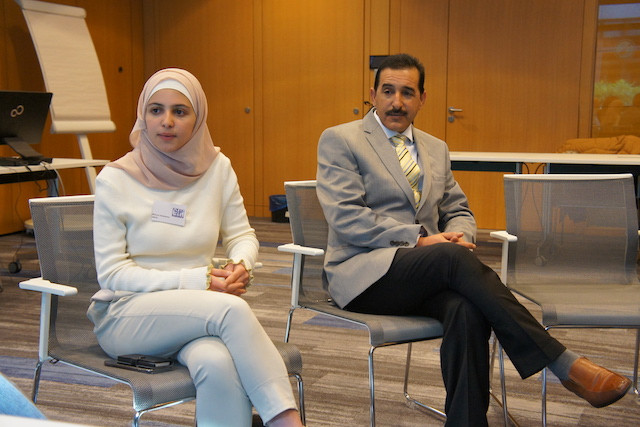Embracing the power of small acts was the message of the fourteenth edition of the Global Issues Network (Gin) conference, a three-day event to empower young people to make a difference.
Keynote speaker and Unicef goodwill ambassador Muzoon Almellehan talked about the large and small acts people can do in education to make a difference. The Syrian national fled Syria with her family in 2013, aged 14, and has campaigned tirelessly to ensure displaced young people pursued a good education in the Jordanian refugee camps. Since seeking asylum in the UK, Muzoon continues her advocacy work, raising awareness of the obstacles to education faced by young people in conflict zones. She was invited to the Gin conference as the youngest and first refugee Unicef goodwill ambassador for education. Here are five things audiences took away from the Luxembourg Chamber of Commerce at the conference opener on Thursday.
No-one is too small to act
The idea that size doesn’t matter was a red line through the speeches on Thursday. Finance minister Pierre Gramegna talked about how Luxembourg, despite its diminutive size, is a trailblazer for the environment. Next month it will introduce a 1-2 cent excise on fuel and in March 2020 public transport will be made free of charge. Almellehan added: “You must never under-estimate the power of small actions we all make. We must act, not wait for others to help us.”
Don’t take everything you read and see at face value
When asked about how to respond to growing unfounded fears about refugees, Almellehan urged attendees to meet these people where possible. “Schools should visit the refugee camps. They are very safe,” she said. “If you could go and witness these challenges, it would be great.” Where this is not possible, she urged people to read about the countries these people are from, and learn about their history and beauty “These people didn’t choose to become refugees […] Awareness is part of the education.”
Draw strength from those around you
Almellehan was accompanied by her father, a primary school teacher in Syria, who is learning English to resume his career in Newcastle where the family live in the UK. Almellehan described her father as her “greatest supporter.” She said: “I’m so lucky to have a father who supports me in what I’m doing as an activist. Unfortunately, in our culture we don’t see so many parents, especially fathers don’t support their daughters. Some people. Without my dad I cannot achieve so many of the things I have achieved,” she said.

Photo: Delano. Unicef goodwill ambassador Muzoon Almellehan is pictured at the Luxembourg Chamber of Commerce on 28 March
Access to education is more than books
Unicef Luxembourg’s Paul Heber explained that 2019 marks the eighth year of the war in Syria, which has left over 5 million children and young people in need. Children face social pressure to marry young, difficulties in accessing books and in having space to study in some of the refugee camps in Jordan. In 2013, Unicef launched the ‘No Lost Generation’ campaign, ensuring access to education, safety, quality and more. “A couple of years ago Luxembourg put up solar kiosks in camps with satellite companies which managed to have internet,” Heber said, adding: “Because it’s crucial not just for education but for social media. These children need to feel they are part of the world we live in. It’s not just a school and four walls, it’s so much more.”
Activism is a responsibility
Almellehan describes herself as an activist for education, a role that has enabled her to travel the world with Unicef. But this role comes with great responsibility, which requires drawing on a deep well of self-belief and conviction. She described the challenge of convincing people to make education for their child a priority when they had so little.
“I had reactions from some people who said it’s not your business to convince us about education or tell us things we know better than you for our children’s futures. They said when we go back to Syria, we will make it a priority,” she said, adding: “Those reactions make me continue and be stronger because I know what I’m doing is so important […] Sometimes it makes you sad. But, if you want to be an activist and carry this responsibility you have to be strong. […] Remind yourself you have things to be thankful for. Think about the positives.”
This year’s Gin conference focuses on the theme of committing to our world’s most-vulnerable people, places and resources. Over 30 schools from around the world are participating, including four schools in Luxembourg.
